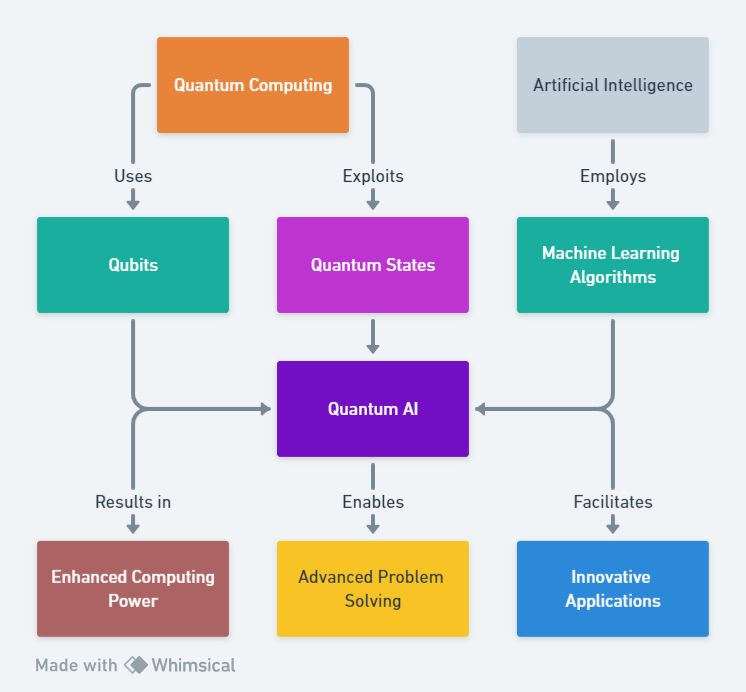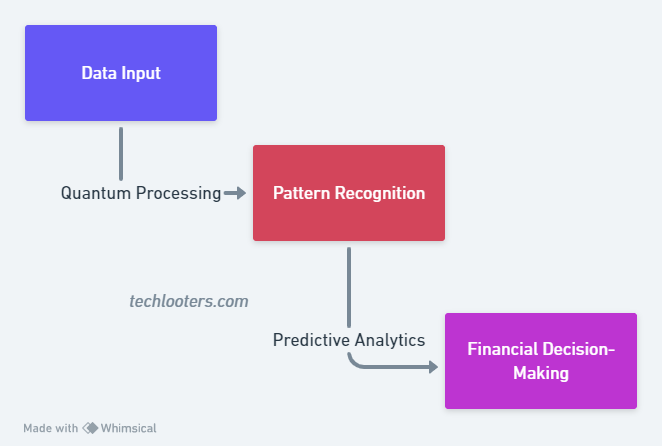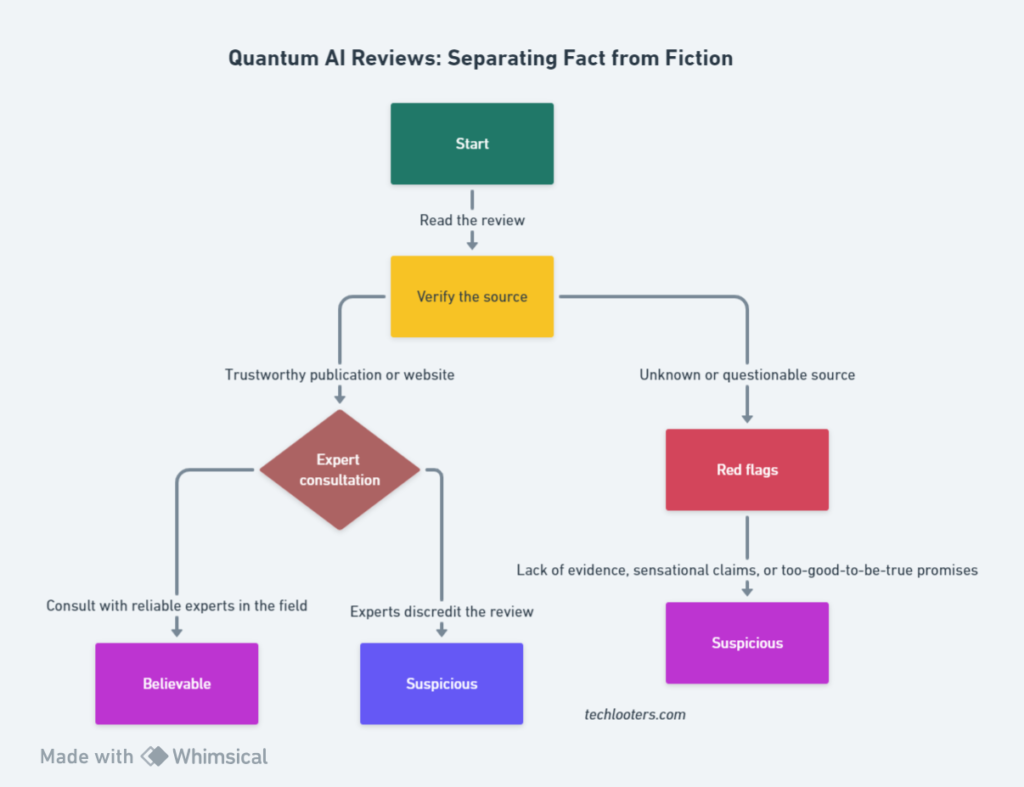Quantum Artificial Intelligence (QAI) represents an innovative fusion of quantum computing and machine learning (ML) techniques, creating a powerful tool for data processing and algorithm development across various applications.
What is Quantum AI
Quantum AI leverages the unique capabilities of quantum computing, such as superposition and entanglement, to perform calculations beyond the reach of classical computers. This enhanced computing power allows for more rapid and accurate problem-solving, making QAI particularly beneficial in fields requiring complex data analysis and prediction.
Key Areas of Impact
- Increased Computing Power: QAI can handle complex problems that classical computers cannot, significantly boosting computational capabilities.
- Accelerated Machine Learning: The processing speed of quantum computers enables faster execution of ML algorithms, facilitating real-time analysis of massive datasets.
- Improved Predictions and Optimizations: QAI's advanced predictive abilities are valuable in sectors like finance, where accurate forecasting can lead to substantial gains. It also optimizes complex systems such as supply chains or transportation networks.
- Innovative Applications: QAI finds applications in various industries, including finance for trading and risk management, healthcare for drug discovery and personalized medicine, and the energy sector for optimizing power grids.
- Challenges and Future Directions: Despite its potential, QAI faces challenges, particularly in building reliable quantum computers and developing novel algorithms that fully harness quantum computing's unique properties. As research progresses, QAI is expected to revolutionize computing methodologies and significantly impact diverse industries.

The Synergy of QAI and Quantum Computing
The integration of QAI and quantum computing promises to revolutionize many industries. Quantum computing's unique properties enable QAI to perform calculations that classical computers cannot, leading to significant advances in computing power, speed, and efficiency.
QAI is a groundbreaking technology that melds quantum computing's power with AI's versatility. This combination has the potential to reshape the landscape of AI, offering faster and more accurate problem-solving, predictions, and optimizations. However, it's essential to address the challenges of noise and errors in quantum computers to realize QAI's potential fully. As research and development continue, the future of QAI looks promising, with the potential to significantly impact various fields.
The Emergence of Google's Quantum AI
Google's Quantum AI represents a significant advancement in quantum computing. The company's efforts centre on building quantum processors and developing novel quantum algorithms. Their state-of-the-art quantum data centre and research lab in Santa Barbara are at the forefront of these developments.
Breakthroughs and Achievements
- Quantum Supremacy: Google achieved a significant milestone in quantum computing by performing a complex calculation on a quantum processor in 300 seconds, a task impractically long for classical computers.
- Advancements in Quantum Algorithms: Google's research focuses on developing and refining quantum algorithms, contributing significantly to the field.
- Quantum Error Correction: Their work on quantum error correction techniques is vital for reducing correlated errors in physical qubits, enhancing the stability and reliability of quantum computations.
Google's Quantum AI and Machine Learning
Google has been integrating quantum computing with machine learning, exemplified by TensorFlow Quantum. This open-source library for quantum machine learning shows the potential of combining classical machine learning techniques with quantum computing.
Future Prospects and Challenges
As Google Quantum AI progresses, it faces challenges like achieving fault-tolerant quantum computing and dealing with the inherent complexities of quantum systems. Despite these hurdles, their continuous research and development promise significant contributions to quantum computing and AI.

Google's Quantum AI is a testament to the rapid advancements in quantum computing and its integration with artificial intelligence. While the journey is fraught with challenges, the potential impact on various industries is immense. As quantum computing becomes more accessible and robust, its applications in AI will likely lead to groundbreaking innovations and efficiencies across multiple sectors.
Elon Musk and the Quantum AI Frontier
Elon Musk's involvement in Quantum AI, though not as prominent as his ventures in space exploration and electric vehicles, still garners significant interest due to his influential status in tech. Musk's interest in AI, in general, is well-known, but his direct involvement in quantum AI is less clear.
Musk's Views on AI
Elon Musk has frequently voiced his opinions on AI, highlighting potential risks and advocating for careful development and regulation. His concerns are more about general AI rather than quantum AI specifically. Musk's views on AI reflect a cautious approach, emphasizing the need for safety and ethical considerations in AI development.
Quantum AI and Musk's Ventures
While there is no direct evidence of Musk's active involvement in quantum AI through his companies, the potential intersection of quantum computing and Musk's industries, like space exploration (SpaceX) and electric vehicles (Tesla), must be addressed. Quantum AI could revolutionize areas such as advanced materials research, optimization problems in logistics, and computational capabilities, which are all relevant to Musk's business ventures.
The Broader Impact of Quantum AI
Regardless of Musk's direct involvement, the advancements in quantum AI will likely indirectly impact his companies. For instance, enhanced computational abilities could lead to more efficient battery designs for electric vehicles or more effective algorithms for space mission simulations.
Elon Musk's direct connection to quantum AI may be minimal, but the broader implications of quantum AI advancements are highly relevant to the technological sectors he is involved in. As quantum AI continues to develop, its potential applications in industries like space exploration, automotive, and renewable energy could intersect with Musk's visionary projects.
Understanding Quantum AI Trading Systems
Quantum AI trading systems represent an intriguing merger of quantum computing and financial trading. These systems leverage the computational superiority of quantum computing to analyze vast amounts of financial data, making predictions and decisions at speeds and accuracies unattainable by traditional methods.

How Quantum AI Transforms Trading
- Speed and Efficiency: Quantum computers can process and analyze large datasets much faster than classical computers, making them ideal for the rapid pace of financial markets.
- Complex Pattern Recognition: Quantum AI systems can identify subtle patterns and correlations in market data that traditional algorithms might miss.
- Predictive Analytics: Enhanced computational power allows these systems to predict market trends and movements with a higher degree of accuracy.
- Risk Management: Quantum AI can evaluate complex risk factors quickly, aiding in more effective risk management strategies.
The Potential and Challenges
While the potential benefits of quantum AI in trading are vast, the technology is still in its nascent stages. The primary challenges include the current limitations in quantum computing technology and the need for further development of specialized quantum algorithms for trading.
Future Outlook
As quantum computing technology matures, quantum AI trading systems are expected to become more sophisticated and widespread. This could lead to significant changes in financial markets, offering greater efficiency and new opportunities for traders and investors.
Quantum AI trading systems mark a significant step forward in applying advanced computing technologies in the financial sector. While still evolving, these systems promise to revolutionize trading strategies and market analysis in the future as the capabilities of quantum computing continue to grow.
Quantum AI Reviews: Separating Fact from Fiction
Quantum AI technology, while groundbreaking, is often surrounded by a mix of genuine advancements and speculative claims. Discerning the factual developments from overstated promises or even scams is crucial.
Evaluating Quantum AI Reviews
- Assessing Credibility: When reviewing Quantum AI products or services, it's important to consider the source's credibility. Established scientific publications and recognized quantum computing and AI experts should be prioritized.
- Understanding the Technology: A basic understanding of what quantum AI can and cannot do is essential. Quantum AI, while advanced, is still in its developmental stages and has limitations.
- Realistic Expectations: Quantum AI is a field full of potential, but it's important to be wary of claims that sound too good to be true. Realistic expectations are key in assessing quantum AI technologies' viability and future potential.
Common Misconceptions and Overstatements
- Instant Solutions: Some reviews may incorrectly suggest that quantum AI can immediately solve complex problems that traditional computing cannot. In reality, quantum AI is progressing but still faces significant challenges.
- Overhyped Capabilities: Be cautious of reviews that overstate the capabilities of current quantum AI technology. It's an evolving field, and while advancements are being made, the technology still needs to be at the point of widespread practical application.
The Role of Expert Analysis
Expert analysis is crucial in separating fact from fiction in quantum AI. Look for reviews and insights from professionals and academics who are actively working in the field of quantum computing and AI.
Navigating the world of Quantum AI requires a careful and informed approach. By critically assessing the source and content of reviews and staying updated with credible advancements in the field, one can better understand where quantum AI currently stands and where it is headed.
Investing in Quantum AI: A Guide to Quantum AI Stocks
Investing in Quantum AI involves navigating a rapidly evolving sector that blends advanced technology with financial markets. As Quantum AI technology develops, it presents new opportunities for investors but also comes with unique challenges and considerations.
Understanding Quantum AI Stocks
- Technology and Market Potential: Quantum AI companies are at the forefront of developing quantum computers and integrating AI. Their growth potential is tied to technological breakthroughs and market adoption.
- Long-Term Investment: Given the nascent stage of Quantum AI, investing in this sector is often viewed as a long-term strategy. Breakthroughs in quantum computing could lead to significant returns, but patience is key.
- Risks and Volatility: Quantum AI stocks can be volatile, reflecting the uncertainties and rapid changes in the technology sector. Investors should be prepared for fluctuations and conduct thorough research.
Key Considerations for Investors
- Diversification: As with any investment, diversification is important. Considering a mix of established tech companies and emerging Quantum AI startups can balance potential risks and rewards.
- Research and Due Diligence: Stay informed about the latest quantum computing and AI developments. Understanding the technology, market trends, and company-specific factors is crucial for making informed decisions.
- Regulatory Environment: Keep an eye on the regulatory landscape, as it can impact the development and commercialization of Quantum AI technology.
Emerging Trends and Companies
- Leading Players: Companies like Google, IBM, and Microsoft actively invest in quantum computing research. Emerging startups in the quantum AI space are also worth exploring.
- Sector Growth: The quantum computing market is expected to grow significantly, driven by technological advancements and increasing commercial applications.
- Partnerships and Collaborations: Watch for strategic partnerships between tech companies and quantum AI startups, which can indicate potential growth and investment opportunities.
Investing in Quantum AI stocks is an opportunity to be part of a cutting-edge technology sector with substantial growth potential. However, it requires careful analysis and understanding of the technology and market dynamics. Keeping abreast of technological advancements, company news, and market trends will be key for investors navigating this exciting yet complex field.
The Reality Behind Quantum AI Scams: What You Need to Know
Quantum AI has attracted its share of scams and misleading claims, as with any emerging technology. Consumers and investors must know these and understand how to identify and avoid scams.
Identifying Quantum AI Scams
- Unrealistic Promises: Be wary of claims offering instant or miraculous solutions using Quantum AI. Real quantum computing and AI are complex and still under development.
- Lack of Credible Information: Scams often need more detailed and credible information about the technology. Genuine Quantum AI developments are usually backed by research and have verifiable information.
- High-Pressure Sales Tactics: Scammers may use high-pressure tactics to rush decisions, often emphasizing limited-time offers or guaranteed returns.
Steps to Protect Yourself

Understanding the Risks
- Emerging Technology: Quantum AI is still an emerging field with many uncertainties. It's essential to approach any investment or product in this area with a healthy scepticism.
- Regulatory Landscape: The regulatory environment around Quantum AI is still evolving, which can impact investments and the legitimacy of certain ventures.
- Market Volatility: The Quantum AI market can be volatile, reflecting the rapid pace of technological change and market speculation.
While Quantum AI holds great promise, it's essential to approach it with caution and awareness. Being informed and vigilant can help avoid scams and make more educated decisions about using Quantum AI technologies and investments. It's essential to stay updated with credible advancements in the field and consult experts when necessary.
What is Quantum Artificial Intelligence (QAI)?
Quantum Artificial Intelligence combines quantum computing with machine learning techniques to process data and develop algorithms more efficiently than traditional computing methods.
How does Quantum AI differ from traditional AI?
Quantum AI leverages the unique capabilities of quantum computing, like superposition and entanglement, to perform complex calculations faster and more accurately than classical computers used in traditional AI.
What are the applications of Quantum AI?
Quantum AI finds applications in various sectors, including finance for trading and risk management, healthcare for drug discovery and personalized medicine, and energy for optimizing power grids.
What are the key benefits of Quantum AI?
Key benefits include increased computing power, accelerated machine learning processes, improved predictive analytics, and the ability to handle complex optimization problems.
How is Google contributing to Quantum AI?
Google's Quantum AI focuses on building quantum processors and developing novel quantum algorithms, with significant achievements like demonstrating quantum supremacy.
What role does Elon Musk play in Quantum AI?
Elon Musk's direct involvement in Quantum AI is not prominent, but the advancements in Quantum AI could impact his companies in areas like advanced materials research and computational capabilities.
What are the challenges facing Quantum AI?
Challenges include building reliable quantum computers, developing specialized algorithms, and addressing issues like noise and errors in quantum systems.
Are there Quantum AI trading systems?
Yes, Quantum AI trading systems use quantum computing to analyze financial data, offering faster and more accurate market predictions and risk management strategies.
Can I invest in Quantum AI?
Investing in Quantum AI is possible through stocks in companies developing quantum computing and AI technologies, though it requires understanding the technology's potential and market risks.
How can I differentiate between Quantum AI facts and scams?
To differentiate between facts and scams in Quantum AI, look for information from credible sources, understand the realistic capabilities of the technology, and be wary of claims offering instant solutions or guaranteed returns.





Pingback: Digital Twin Technology Vs Simulation: Which Technology is best? Case Study - techlooters.com